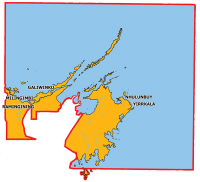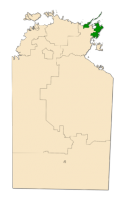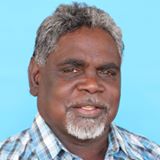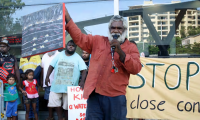Two Aboriginal men will run as independents for election to the 25-member parliament of Australia’s Northern Territory, where about a third of the population of 228,000 are Aboriginal, the highest proportion nationwide. They are Yingiya Mark Guyula, campaigning mainly for treaties between Aborigines and the white invader society, and Jack Green Warngkurli, whose focus is pollution by miners and a new approach to youth justice issues in the Northern Territory, where teenage boys have been brutalised in prison. In 2012 for the first time indigenous voters changed an Australian government, throwing out Labor and bringing in the conservative Country Liberal government of Chief Minister Adam Giles.
After a roller coaster four years in office, it is tipped to become the Northern Territory's first one-term government when voters go to the polls on Saturday 27 August.
The Giles government has been in a semi-constant state of chaos, beset by scandals, sackings, allegations of corruption, defections, un-defections and all manner of leaking and internecine nastiness. A new poll confirms the widely held view that the Northern Territory's Country Liberal Party government is set to be decimated in the election. The poll has Labor leading 64-36 but points out it’s difficult to measure intentions in the far-flung Aboriginal communities.
One in five entitled Territorians have not enrolled to vote, though voting is compulsory across Australia (and non-voters can be fined), and most of those absentees are likely to be Aborigines. Not only are half the Aborigines not registered as voters, few who are, actually do vote because they are disgusted with a white-dominated system whose two main parties – Liberal (right-of-centre conservative) and Labor (social democrat) - implement basically the same policies that harm Aborigines.
Nayuka Gorrie, a youth worker descended from four tribes, comments that Aborigines “not voting shouldn’t be confused with apathy”. “For many black people, not voting is a political act in itself…. why vote in a system that …. lacks representation of black people. …. For those of us who identify as sovereign, not voting is resistance. …. Forcing us to participate in the election of a state that we haven’t agreed to be a part of is a little bit weird.” For more of his and other anti-voting argument click here and scroll down to Nayuka Gorrie.
In a YouTube clip (6 min 32 sec) he explains how he wants Yolngu and Westminster (white) governments to work together as equal partners. He’s also given a 10-minute interview in a Yolngu language on Yolngu Radio.
The 25 electoral divisions of the Northern Territory comprise a land mass equal to the combined areas of France, Spain and Italy.
Guyula, from the Yolŋu people group, Djambarrpuyŋu nation and the Liya-dhalinymirr tribe, wants the seat of Nhulunbuy, saying in a media statement that he has been chosen to stand by the Yolngu Nations Assembly representing eight provinces from East, Central and North West Arnhem Land.
From his media statement: “The 2016 Northern Territory election will be very important for East Arnhem Land. I want it to be marked as a milestone for the Treaty movement. In 2011 leaders in East Arnhem Land founded the Yolngu Nations Assembly to resource practical work toward a treaty for Arnhem Land. Everyone knows we have sought a treaty from Australian governments since the Barunga Statement of 1988, and with two later petitions in 1998 and 2008. Governments have largely ignored these diplomatic gestures, so we decided to stop waiting and get started.
“Yolngu Nations Assembly continues to develop, but to progress our core issue of a treaty we think it necessary to have one of our own law people in a parliament of Australia. I have been selected for this job by the Assembly.” See more of his programme here. The Yolngu are one of the most cohesive, culturally strong and politically active and visible Aboriginal groups, inhabiting north-eastern Arnhem Land.
Nhulunbuy is a mixed electorate that combines the bauxite mining town of Nhulunbuy (also called Gove) with numerous Aboriginal communities, including Nhulunbuy, Galiwinku, Yirrkala and Gapuwiyak, and surrounding outstations. 52% of the electorate is of indigenous origin. It covers 113,500 sq.km.
Nhulunbuy has traditionally been a safe seat for the Australian Labor Party, which has held it since 1980. The incumbent is Lynne Walker. Labor's dominance in the seat is due mostly to strong support among indigenous voters, more than 50% of the electorate's population being indigenous. 5,895 people are on the electoral roll.
Guyula will also have to beat Jackson Anni (also independent), and Charlie Yunupingu (Country Liberals). The Yunupingu name is a powerful drawcard in these parts. It belongs to an extended family prominent in several fields, including education and music.
Respected Garawa Elder, artist and activist, Jack 'Wongili' Green, wants the seat with the largest area in the Northern Territory, Barkly, based on Tennant Creek and the Barkly Tablelands. To win it he, too, will have to unseat a Labor incumbent since 2008, Gerry McCarthy. He’d also have to beat another independent, Elliot McAdam, and a Country Liberal, Tony Jack. One of Green's catchlines is, "Nothing has really changed since whitefellas came. First it was horses, now bulldozers".
Seventy percent of the electorate’s population of about 8,000 people are Indigenous. The area consists primarily of Aboriginal communities and remote pastoral stations; 5,100 are eligible to vote. It has been a Labor seat since 1990.
Green said his concerns about how mining company Glencore and the NT and Federal Government regulators had handled pollution from the mine's waste dump had motivated him to run. "Aboriginal people of Borroloola, we don't think they've done enough, they should be looking at it a bit more because we think that waste dump it’s not stable enough," he said.
The concerns of Aboriginal clans in the Gulf of Carpentaria region were sparked when reactive iron pyrite rock in the mine's waste rock dump started spontaneously combusting in 2013. Glencore doused the plume but is still grappling with how to prevent acid, alkaline and heavy metal leaching from the reactive rock in the dump.
Should Green win – a prospect supporters say is not unrealistic – he hopes to push for better housing and health outcomes for Aboriginal people who live on remote homelands and outstations. Development – including tourism and business – should be worked on in consultation and partnership with Aboriginal residents, he says. He urged young people to vote: “It’s vital that you enrol to vote. The future is about all of us black and white, young and old working together.”
Mobile teams will travel to more than 170 locations to provide remote Territorians an opportunity to vote. Mobile technology is being employed to inform remote voters about details of voting in their community by sending an SMS.
A digital interpreter product, translated into 13 indigenous languages, has been developed to inform voters of the optional preferential voting system.





Recently here on linksunten
Freedom Day Festival - blackfella, whitefella unite as one
Suicide of 15-year-old boy in Don Dale - broken and ruined lives
Underground fish, beetles, spiders, scorpions stop uranium mine
"To break the will and determination of Aboriginal people cowardly governments attack our youth"
“This week, Australia is a boy in a hood in a cell"
NT juvenile detention abuse royal commissioner needs no introduction to black Territorians
Aborigines were NOT nomads – stirring for more teaching of Aboriginal history
Aboriginal children stripped, tear-gassed, brutalised in Northern Territory prison
Support swelling for treaty, falling for recognition in the constitution
New threat to remove Aborigines from tiny remote communities
Aboriginal mothers are 17.5 times more likely to be victims of homicide in Western Australia than other mums
Does Indigenous Australia need a Black Lives Matter movement?
First Aboriginal woman in Australia’s main parliament – tokenism or indigenous power boost?
We must die standing and fighting and not lay down and let these bastards have their own way
Aboriginal children as young as 8, 9, 10 and 11 years of age killing themselves
Indigenous land owners appeal to minister's 'human side' to shelve proposed nuclear waste site